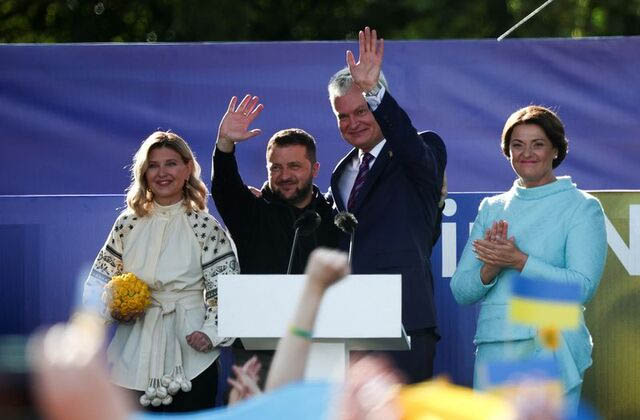VILNIUS, (Reuters) – NATO leaders said yesterday that Ukraine should be able to join the military alliance at some point in the future but they stopped short of offering Kyiv an immediate invitation, angering Ukrainian President Volodymyr Zelenskiy.
The leaders were meeting at a summit in the Lithuanian capital Vilnius as Ukrainian troops struggled to make significant gains in a counteroffensive against the Russian invasion forces occupying parts of the country.
The leaders said in a declaration: “Ukraine’s future is in NATO”. But they offered no timeline for the process.
“We will be in a position to extend an invitation to Ukraine to join the alliance when allies agree and conditions are met,” the declaration said, without specifying the conditions Ukraine needs to meet.
NATO did drop a requirement for Ukraine to fulfil what is called a Membership Action Plan (MAP), effectively removing a hurdle on Kyiv’s way into the alliance.
Even before the release of the declaration, Zelenskiy had assailed NATO leaders.
“It’s unprecedented and absurd when a timeframe is not set, neither for the invitation nor for Ukraine’s membership,” Zelenskiy said before arriving in Vilnius as a special guest.
Speaking at a rally in Vilnius on Tuesday, Zelenskiy voiced disappointment that Ukraine was not invited to join NATO.
“NATO will make Ukraine safer, Ukraine will make NATO stronger,” he told the thousands of people, many waving Ukrainian flags.
“I travelled here today with belief in a decision, with belief in partners, with belief in a strong NATO…”
“I would wish for this belief to become a certainty – certainty in decisions that all of us deserve and which our every soldier expects, our every citizen, our every mother, our every child. And is this too big of a wish?” he asked.
The NATO stance highlighted the divisions among its 31 members over giving a date or a straightforward invitation for Ukraine to join. Kyiv has been pushing for a swift entry, bound together with security guarantees, since even before Russia unleashed its invasion in February 2022.
NATO members in eastern Europe have backed Kyiv’s call, arguing that bringing Ukraine under NATO’s security umbrella is the best way to deter Russia from attacking again.
Countries such as the United States and Germany have been more cautious, wary of any move that they fear could draw NATO into a direct conflict with Russia.
The NATO declaration said: “We reaffirm our unwavering solidarity with the government and people of Ukraine in the heroic defence of their nation, their land, and our shared values.”
In strong language towards Moscow, it said: “The Russian Federation is the most significant and direct threat to Allies’ security and to peace and stability in the Euro-Atlantic area.”
Asked about Zelenskiy’s criticism, NATO Secretary General Jens Stoltenberg told a press conference: “There has never been a stronger message from NATO at any time, both when it comes to the political message of the path forward for membership and the concrete support from NATO allies.”
He said previous accessions to NATO had not been accompanied by a timeline. “They are conditions-based, have always been,” he said.
Zelenskiy did score wins elsewhere. French President Emmanuel Macron said Paris would start supplying long-range cruise missiles, following a similar announcement by Britain.
These will allow Ukrainian forces to hit Russian troops and supplies deep behind the front lines.
Germany announced new aid worth 700 million euros, including two Patriot air defence missile launchers, and more tanks and fighting vehicles.
The summit was also buoyed by the prospect of Sweden joining NATO as its newest member after Turkish President Tayyip Erdogan on Monday abruptly dropped his objections to the move, while pushing to revive talks for Turkey to join the European Union.
Moscow, which has cited NATO’s eastern expansion as a factor in its decision to invade Ukraine, has criticised the two-day summit ending on Wednesday and warned Europe would be the first to face “catastrophic consequences” should the war escalate.
“Potentially, this issue (of Ukraine joining NATO) is very dangerous for European security… and therefore those who will make the decision must be aware of this,” Kremlin spokesperson Dmitry Peskov said.
European leaders did not seem to understand that moving NATO military infrastructure towards Russia’s borders was a mistake, he said.
At the rally in Vilnius, Lithuanian President Gitanas Nauseda handed Zelenskiy a bullet-holed Ukrainian flag which had been flown on a Ukrainian tank during battles in Bakhmut.
“Ukraine is buying us time with their blood, so we can prepare and give a strong retort to Russia,” Nauseda told the crowd.

